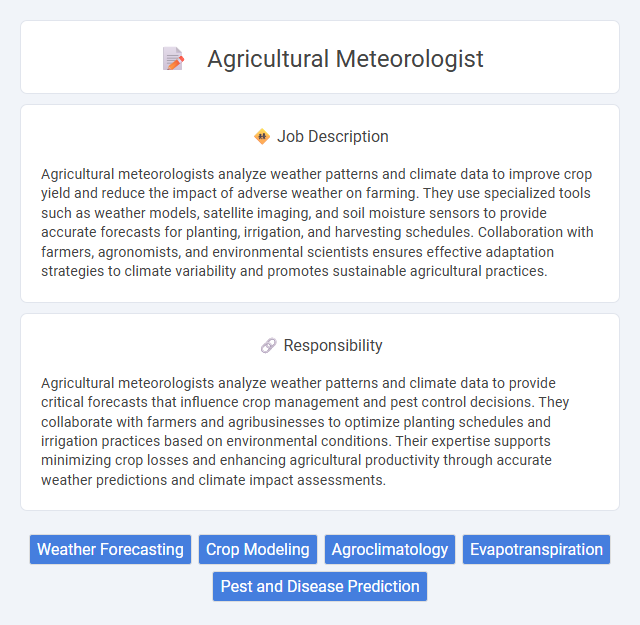
Agricultural meteorologists analyze weather patterns and climate data to improve crop yield and reduce the impact of adverse weather on farming. They use specialized tools such as weather models, satellite imaging, and soil moisture sensors to provide accurate forecasts for planting, irrigation, and harvesting schedules. Collaboration with farmers, agronomists, and environmental scientists ensures effective adaptation strategies to climate variability and promotes sustainable agricultural practices.
Individuals with a strong interest in weather patterns and their impact on agriculture are likely suitable for a career in agricultural meteorology. Those who enjoy data analysis, problem-solving, and working outdoors may find this role engaging and fulfilling. However, people who prefer routine tasks or limited interaction with scientific data might face challenges adapting to the dynamic and interdisciplinary nature of this profession.
Qualification
A career as an agricultural meteorologist requires a strong foundation in atmospheric sciences, typically evidenced by a bachelor's or master's degree in meteorology, agricultural science, or environmental science. Proficiency in data analysis, climate modeling, and experience with remote sensing technology are essential for interpreting weather patterns and their impact on crop production. Advanced certifications or specialized training in agro-meteorological systems enhance job prospects and the ability to provide accurate climate forecasts for agricultural planning.
Responsibility
Agricultural meteorologists analyze weather patterns and climate data to provide critical forecasts that influence crop management and pest control decisions. They collaborate with farmers and agribusinesses to optimize planting schedules and irrigation practices based on environmental conditions. Their expertise supports minimizing crop losses and enhancing agricultural productivity through accurate weather predictions and climate impact assessments.
Benefit
An agricultural meteorologist is likely to provide critical weather forecasts that can improve crop yields and reduce losses due to adverse weather conditions. Their expertise may help farmers optimize planting schedules and irrigation practices, leading to increased efficiency and cost savings. Employing agricultural meteorologists could result in enhanced food security and sustainable farming practices.
Challenge
The role of an agricultural meteorologist likely involves the challenge of accurately predicting weather patterns to optimize crop yield and minimize losses. They may need to analyze complex climate data to provide actionable insights amid uncertain environmental conditions. Navigating rapidly changing weather phenomena could require continuous adaptation and advanced forecasting tools.
Career Advancement
Agricultural meteorologists specializing in weather patterns impacting crop production can advance their careers by gaining expertise in climate modeling and precision agriculture technologies. Mastery of remote sensing data and proficiency in Geographic Information Systems (GIS) enhance their value for research institutions and agri-business companies. Leadership roles often require strong skills in data analysis, project management, and interdisciplinary collaboration within agronomy and climatology fields.
Key Terms
Weather Forecasting
Agricultural meteorologists specialize in weather forecasting to support farming activities by predicting temperature, precipitation, and severe weather events that impact crop growth and soil conditions. Utilizing satellite data, weather models, and climate analysis, they provide critical information for irrigation planning, pest control, and harvesting schedules. Their forecasts help optimize agricultural productivity and reduce economic losses caused by adverse weather.
Crop Modeling
Agricultural meteorologists specializing in crop modeling analyze weather patterns and climate data to predict crop growth, yields, and potential risks such as drought or disease. They use advanced simulation tools and climate models to optimize planting schedules and irrigation strategies, improving agricultural productivity and sustainability. Their expertise supports farmers and agribusinesses in decision-making processes that mitigate the impact of adverse weather on crop production.
Agroclimatology
Agricultural meteorologists specializing in agroclimatology analyze climate patterns to optimize crop production and mitigate risks associated with weather variability. They use advanced climate models and historical weather data to provide actionable forecasts that support sustainable farming practices and improve food security. Expertise in agroecology and soil-atmosphere interactions enhances their ability to advise on irrigation, pest management, and crop selection based on climatic conditions.
Evapotranspiration
Agricultural meteorologists specialize in monitoring evapotranspiration rates to optimize water usage and improve crop yield predictions. They analyze weather data, soil moisture, and plant physiology to model evapotranspiration processes critical for irrigation scheduling and drought management. Advanced remote sensing technologies and climate models enhance their ability to assess evapotranspiration impacts on agricultural productivity and resource conservation.
Pest and Disease Prediction
Agricultural meteorologists utilize climate data and weather forecasting models to predict pest outbreaks and disease incidence, enabling farmers to implement timely interventions that protect crops. Advanced remote sensing technologies and machine learning algorithms enhance accuracy in identifying environmental conditions conducive to pest proliferation and pathogen spread. Effective pest and disease prediction supports sustainable agricultural practices by reducing reliance on chemical controls and minimizing crop losses.
 kuljobs.com
kuljobs.com